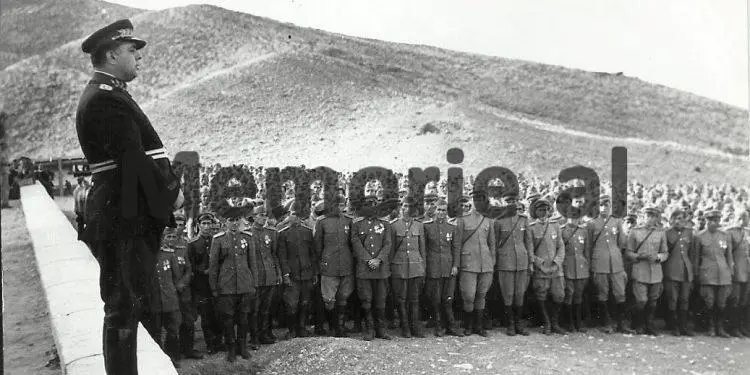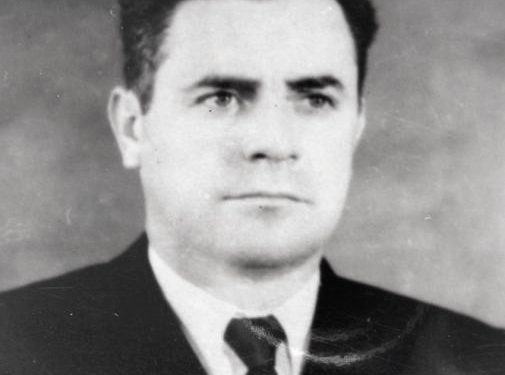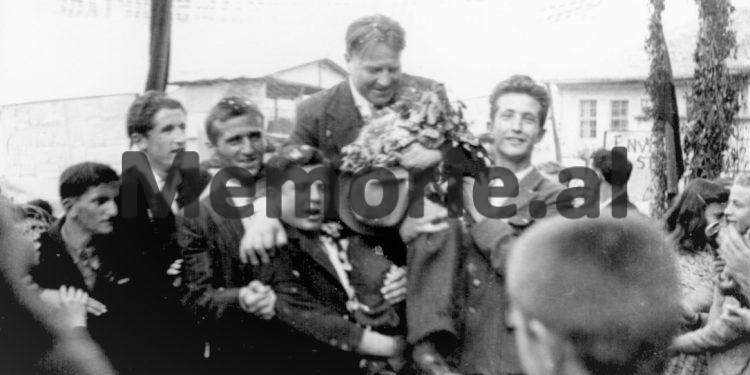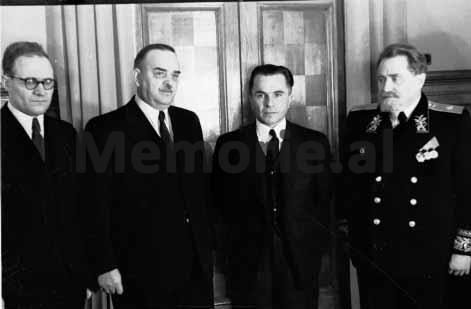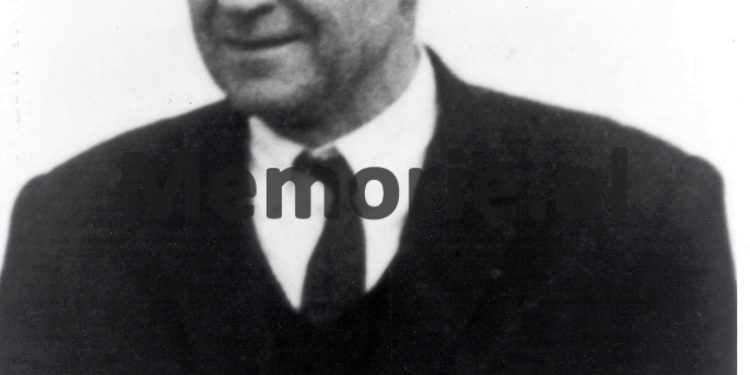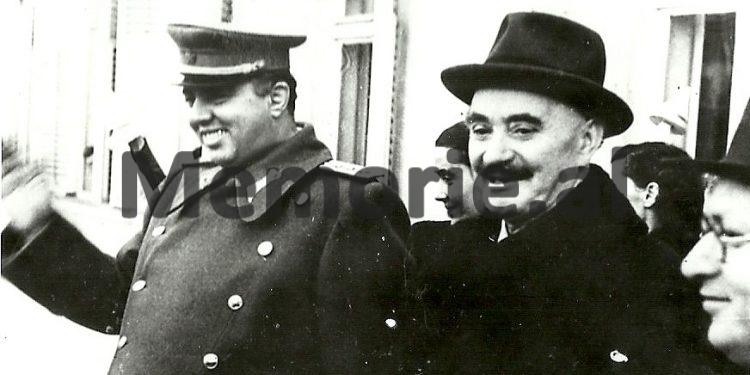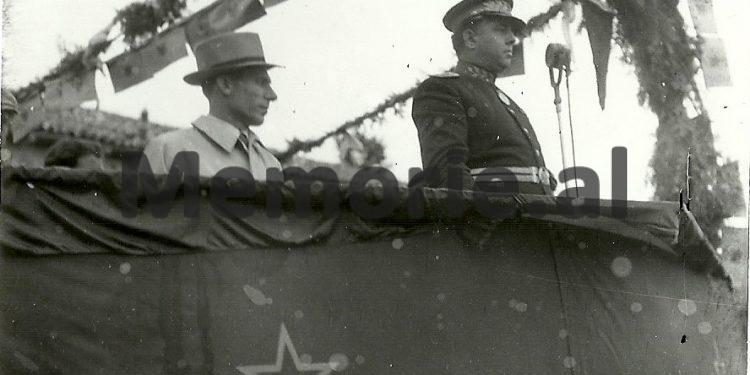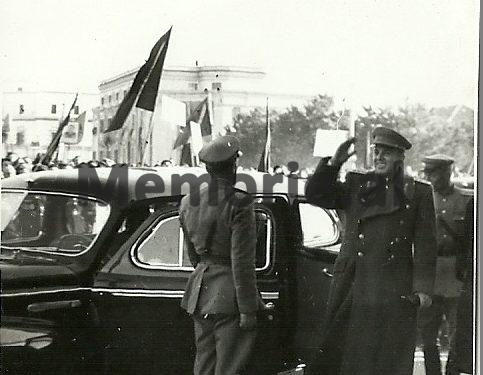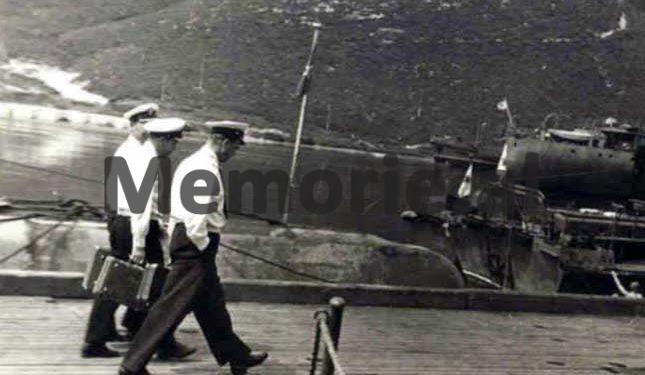Dashnor Kaloçi
The third part
Memorie.al publishes the unknown story of Major General Panajot Plakut, originally from the village of Hoçisht in Devoll, Korça, who after graduating from the “Normal” school in Elbasan in 1936, returned to the city of Korça where he joined groups. communist and during the occupation of the country 1939-1944, he joined the Anti-Fascist Movement and for his activity was arrested and imprisoned by the Italian authorities in the city of Durrës and after his release, he joined the partisan ranks, being appointed as deputy commissioner of the First Assault Brigade commanded by Mehmet Shehu, since its formation in August 1943, in the village of Vidhkuq in Korça. How Panajot Plaku climbed the military career ladder after the end of the War, starting from Commissar and Division Commander in Korça District, Corps Commander, Director of Operational Directorate and Deputy Chief of General Staff of the Albanian Army in the Ministry of People’s Defense with rank and Major-General, Deputy Minister of National Defense for the Border Directorate, to the post of Minister without Portfolio in the government headed by Mehmet Shehu? How could Panajot Plaku escape from Albania in June 1957 (when he was acting Minister without Portfolio and Chairman of the State Committee for Geology) secretly crossing the state border near Lake Pogradec and exiting to Yugoslavia, where he settled in Belgrade as a political asylum and sent a letter to the leader of the Soviet Union, Nikita Khrushchev, denouncing all the crimes of Enver Hoxha and his regime ?! The mystery of the death of Panajot Plaku in 1966 in the hotel where he lived in Belgrade and what he wrote in his memoirs about Enver Hoxha and the senior leadership of the ALP, which he summarized to be published in a book entitled ” Violence over the Revolution in Albania “, and after his death it was also translated into Serbo-Croatian (by Predrag Vuivivi,, editor of the newspaper” Borba “and Vela Popovi,, editor of Belgrade Television), a book that had a great echo and was later published by the Publishing House “Rilindja” of Prishtina in Albanian language in 1985
Followed by the last number
Panajot Plaku against the privileges of the “Bloc” in Tirana!
The death of Kalo Plakut was a very heavy blow for Panajot, due to the fact that he knew very well that his brother was poisoned by the State Security, which meant that Panajot himself from that day on would not had good relations with the Party. In fact the attack on Panayot had started long before his brother Kalua died and since then he had been targeted by the State Security.
In this regard, his family members in their exclusive testimonies for the author of these lines, among other things, testify: “In fact, the attack on Panayot had started with his release from the army, which was a more than clear warning, for his utterly uncertain future, both for himself and for his family.
Panayot could not stand the demobilization from the army and the removal of ranks because he had tied his life to the military uniform. Panayot was an idealistic and very honest communist. He never tolerated injustices and often spoke to us at home about the privileges of the “Bloc” of the senior leadership of the ALP in Tirana and was outraged by the great poverty that had plagued the country.
He had no desire to maintain friendly relations with the families of the senior leadership of the ALP living in “Bllok” and based on that fact, he did not have his marriage inside “Bllok”, as many did. others at that time, making friends with each other, but married Vjollca Taja, originally from Elbasan, who had graduated from the Artistic High School and was a singer at the Opera House in Tirana.
After his engagement to Vjollca in 1951, Panajoti refused to have a wedding, but performed a very simple ceremony, only with the people of the house. Likewise, Panajot’s closest friends were not those of the Politburo, but: Omer Nishani, Dali Ndreu, Teme Sejko, Tahir Kadare, Rrahman Përllaku, Maqo Çomo and others, who, as is already known, were later beaten all by Enver Hoxha, being imprisoned or shot on charges of being “UDB agents”, or “enemies of the people”!
Rather, Panajoti was associated with his brother, Kalo Plaku, and he spent most of his time studying at home. Kalos’s death hit Panayot very hard and he almost did not go into deep depression. The dissatisfaction he had long accumulated towards the top leadership and their privileges, after Kalos’s death, he began to express openly in our house, telling us: “We eat white bread, while the poor people do not there is no bread at all to fill the belly.”
Panajoti was an MP from the Devoll area and he found the opportunity to go there often to ask about their concerns. During a meeting with the villagers of his area, they openly expressed their concerns, saying: “How did you leave us in this state, we have provided you with bread during the war”!
Panajoti was very touched by their words and promised them that instead of going to Tirana he would send you an old truck to have for the cooperative.
Letter from the Minister without Portfolio, Major General Panayot Plakut, addressed to the leader of the Soviet Union, Nikita Khrushchev
Grigorjev expressed dissatisfaction with the behavior of my brother Koço Plakut, who was the chief geologist in the Naft-gaz-bitumen directorate. He told me that my brother was shouting at Soviet experts because of the rumors, that Soviet experts had their own technical leader, to whom they were responding.
I told Grigorjev that Koço Plaku is the chief geologist of the directorate and that he has a duty to ask Soviet experts who feel responsible at work, since there are no other experts in the directorate and, therefore, it is his duty to control them, or should be replaced.
Grigorjev, and especially Kosorotov, insisted that the chief geologist should not check on Soviet experts, but go behind the Soviet technical leader and see how he works. These were my main conflicts with Grigorjev, on the basis of which he accused me in the Central Committee of the Albanian Labor Party of anti-Soviet behavior.
At the Politburo I was probably found guilty of anti-Soviet activities because in conversations with various comrades from the Central Committee of the Party, and even with Enver, I said that we owed the Soviet Union too much in connection with the liberation of our homeland.
I know the role of the Soviet Union in World War II, but I do not think that this role should be raised to such an extent that the National Liberation War and the merits of our people and our Party disappear completely under it.
This is historically incorrect and does not serve the interests of the world revolution, and therefore not the interests of the Soviet Union.
Enver Hoxha also agreed in principle with such a view, and even added that our Party should transfer its experiences to other parties of small peoples, which are waging war against imperialism, for its own national liberation.
I have no anti-Soviet feelings. I acted decisively and spoke out against all the distortions because I was convinced that no one would ever accuse me of anti-Soviet activities, since for my commitment to the Soviet Union, there is hundreds of evidence in my pre-war life, as well as during the war and after the liberation.
As a communist, I have been arrested many times by fascists; as a friend and “agent” of the Soviet Union, the fascists persecuted me.
During the war I fought believing that my weapons and my revolutionary activity not only contributed to the defense of my people, but also helped the Soviet Union.
I performed the above-mentioned tasks primarily because I loved and defended the interests of the Soviet Union.
All the remarks and criticisms I made, all my requests to the Soviet experts not only did not harm the Soviet Union, but on the contrary, contributed to the strengthening of the Albanian-Soviet relations.
I loved, I love and I will love the Soviet Union, despite the fact that Enver calls me an enemy of the USSR. But, unfortunately, the SNP was created in that period, in which the cult of the person of Stalin had reached its culmination, when hundreds of thousands of the best communists were liquidated in the USSR, when whole peoples penetrated, when Stalin he had all the affairs in hand and for this reason Enver had to be one too.
The cult of the person of Stalin did not give our Party the opportunity to consider the question of internal party democracy and for this reason today, from those comrades who attended the meeting for the formation of our Party, from the members of the Provisional Central Committee ( the first Central Committee of our Party), which was elected on the occasion of the formation of our Party, only Enver Hoxha remained in the leadership, and of the members of the first Politburo, only Enver Hoxha remained in the leadership.
In addition, our Party still does not know who attended its founding conference, who was members of the Provisional Central Committee and the first Politburo.
Can we consider such a situation normal in a party, which was formed 16 years ago, when it is known that the oldest participant of that founding conference was not more than 45 years old?
Can we consider as normal the liquidation of all workers, who really were the initiators of the formation of our Party, and not Enver Hoxha, as they are now lying around? It is understood that this is an abnormal position.
Everyone knows that part of the leadership structure was killed in the war, part was liquidated at the time of the strained relations with Yugoslavia, and part after that. All these actions can be justified in some way, but can the expulsion from the Party and the liquidation of the top leaders of the Party after the XX Congress of the USSR KP be justified?
I think this should not have happened at all, and what is most important – in the future it is necessary not to allow similar actions. After the XX Congress of the USSR KP, more than ten old members of the Party were liquidated (expelled from the Party and shot).
I cannot leave without emphasizing here the expulsion from the Party of Tuk Jakova, worker, one of the initiators of the formation of the Party; the expulsion of Bedri Spahiu, one of the most influential communists in the Gjirokastra region and throughout the country; the shooting of Liri Gega, one of the founders of the Party; the shooting of Dali Ndreu, one of the oldest communists in the Dibra region, the shooting of Petro Bullati and others.
Also, I must mention the arrest, expulsion from the Party and other measures that have been taken against several dozen old communists.
Hulusi Spahiu, a Spanish volunteer and general of the Albanian Army, was expelled from the Party, stripped of his rank and became the first deputy minister of People’s Defense, and was appointed chief of warehouses.
There are many such examples. The fight against the cult of personnel in our Party is limited to reducing the slogans for Enver Hoxha and ranking the photos of the leaders according to abe ce des.
Now in Albania there is talk of the Party more than Enver, although recently, on the pretext that it is necessary to maintain authority and in order not to repeat the Tirana Conference, as well as in order not to allow it to happen in Albania, what happened in Hungary, they have again started to attribute to Enver Hoxha all the successes of our Party and our people.
Here is a typical example from recent times. In a documentary, which was shot on the occasion of the return of our delegation of the government and the Party from the Soviet Union, instead of showing the tribune in which Enver Hoxha and Mehmet Shehu gave speeches and where the members of the Central Committee and the government were, only Enver and Mehmeti were shown.
Hundreds of such examples can be mentioned. If you study the life of the Albanian Labor Party from the aspect of your speech at the closed meeting of the XX Congress of the USSR KP, then it will be clearly seen that in Albania it has ruled and still rules with Stalinist methods Enver Hoxha himself. “You know that Tuk Jakova qualified as an enemy of the Party.” Memorie.al
The next issue follows




